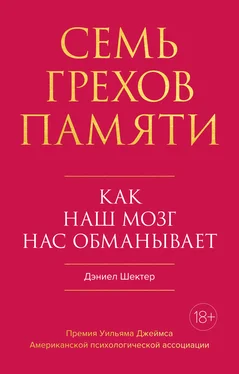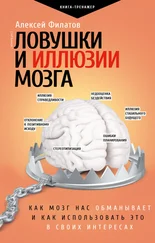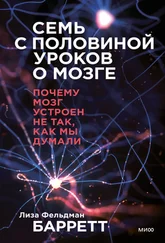Allport G. W . The nature of prejudice. Cambridge, Mass.: Addison-Wesley, 1954.
Anderson J. R., Fincham J. M . Acquisition of procedural skills from examples // Journal of Experimental Psychology: Learning, Memory, and Cognition. 1994. Vol. 20. P. 1322–1340.
Anderson J. R., Milson R . Human memory: An adaptive perspective // Psychological Review. 1989. Vol. 96. P. 703–719.
Anderson J. R., Schooler L. J . Reflections of the environment in memory // Psychological Science. 1991. Vol. 2. P. 396–408.
Anderson J. R., Schooler L. J . The adaptive nature of memory // The Oxford handbook of memory / Eds. E. Tulving, F. I. M. Craik. Oxford; N. Y.: Oxford University Press, 2000. P. 557–570.
Anderson M. C., Spellman B. A . On the status of inhibitory mechanisms in cognition: Memory retrieval as a model case // Psychological Review. 1995. Vol. 102. P. 68–100.
Anderson M. C. Active forgetting: Evidence for functional inhibition as a source of memory failure // Trauma and cognitive science: A meeting of minds, science, and human experience / Eds. J. J. Freyd, A. P. DePrince. N. Y.: Haworth Press. In press.
Arkes H. R., Wortmann R. L., Saville P. D., Harkness A. R . Hindsight bias among physicians weighting the likelihood of diagnoses // Journal of Applied Psychology. 1981. Vol. 66. P. 252–254.
Austen J . Mansfield Park. N. Y.: W. W. Norton, 1816/1998.
Baddeley A. D., Lewis V., Eldridge M., Thomson N . Attention and retrieval from long-term memory // Journal of Experimental Psychology: General. 1984. Vol. 13. P. 518–540.
Baddeley A. D . Is working memory working? // Quarterly Journal of Experimental Psychology. 1992. Vol. 44A. P. 1–31.
Baddeley A. D . Human memory: Theory and practice / 2nd. ed. Boston: Allyn and Bacon, 1998.
Baddeley A. D., Gathercole S., Papagano C . The phonological loop as a language learning device // Psychological Review. 1998. Vol. 105. P. 158–173.
Bahrick H. P . Semantic memory content in permastore: 50 years of memory for Spanish learned in school // Journal of Experimental Psychology: General. 1984. Vol. 113. P. 1–29.
Bahrick H. P., Hall L. K., Berger S. A . Accuracy and distortion in memory for high school grades // Psychological Science. 1996. Vol. 7. P. 265–271.
Bahrick H. P . Long-term maintenance of knowledge // The Oxford handbook of memory / Eds. E. Tulving, F. I. M. Craik. Oxford; N. Y.: Oxford University Press, 2000. P. 347–362.
Bailey C. H., Chen M . Time course of structural changes at identified sensory neuron synapses during long-term sensitization in Aplysia // Journal of Neuroscience. 1989. Vol. 9. P. 1774–1781.
Banaji M. R., Greenwald A. G. Implicit gender stereotyping in judgments of fame // Journal of Personality and Social Psychology. 1995. Vol. 68. P. 181–198.
Banaji M. R., Bhaskar R . Implicit stereotypes and memory: The bounded rationality of social beliefs // Memory, brain, and belief / Eds. D. L. Schacter, E. Scarry. Cambridge, Mass.: Harvard University Press, 1999. P. 137–175.
Basden B. H., Basden D. R., Gargano G. J . Directed forgetting in implicit and explicit memory tests: A comparison of methods // Journal of Experimental Psychology: Learning, Memory, and Cognition. 1993. Vol. 19. P. 603–616.
Berrios G. E . The history of mental symptoms. Cambridge: Cambridge University Press, 1996.
Bevdersdorf D. Q., Smith B. W., Crucian G. P. et al . Increased discrimination of «false memories» in autistic spectrum disorder // Proceedings of the National Academy of Sciences. 2000. Vol. 97. P. 8734–8737.
Bjork E. L., Bjork R. A. Continuing influences of to-be-forgotten information // Consciousness and Cognition. 1996. Vol. 5. P. 176–196.
Bjork R. A., Bjork E. L . On the adaptive aspects of retrieval failure in autobiographical memory // Practical aspects of memory: Current research and issues, 1 / Eds. M. M. Gruneberg, P. E. Morris, R. N. Sykes. Chichester, England: John Wiley, 1988. P. 283–288.
Bogacz T. War neurosis and cultural change in England, 1914–22 // Journal of Contemporary History. 1989. Vol. 24. P. 227–256.
Bornstein B. H., LeCompte D. C. A comparison of item and source forgetting // Psychonomic Bulletin and Review. 1995. Vol. 2. P. 254–259.
Box O., Laing H., Kopelman M. The evolution of spontaneous confabulation, delusional misidentification and a related delusion in a case of severe head injury // Neurocase. 1999. Vol. 5. P. 251–262.
Breckler S. J . Memory for the experiment of donating blood: Just how bad was it? // Basic and Applied Social Psychology. 1994. Vol. 15. P. 467–488.
Bredart S . Retrieval failures in face naming // Memory. 1993. Vol. 1. P. 351–366.
Bredart S., Valentine T. Descriptiveness and proper name retrieval // Memory. 1998. Vol. 6. P. 199–206.
Breen N., Caine D., Coltheart M . Models of face recognition and delusional misidentification: A critical review // Cognitive Neuropsychology. 2000. Vol. 17. P. 55–71.
Brennen T., Baguley T., Bright J., Bruce V. Resolving semantically induced tip-of-the-tongue states for proper nouns // Memory and Cognition. 1990. Vol. 18. P. 339–347.
Brewer J. B., Zhao Z., Glover G. H., Gabrieli J. D. E . Making memories: Brain activity that predicts whether visual experiences will be remembered or forgotten // Science. 1998. Vol. 281. P. 1185–1187.
Brewer W. E . What is recollective memory? // Remembering our past: Studies in autobiographical memory / Ed. by D. C. Rubin. N. Y.: Cambridge University Press, 1996. P. 19–66.
Brewin C. R., Hunter E., Carroll E., Tata P . Intrusive memories in depression // Psychological Medicine. 1996. Vol. 26. P. 1271–1276.
Brewin C. R., Andrews B . Recovered memories of trauma: Phenomenology and cognitive mechanisms // Clinical Psychology Review. 1998. Vol. 18. P. 949–970.
Brewin C. R., Watson M., McCarthy S. et al. Intrusive memories and depression in cancer patients // Behaviour Research and Therapy. 1998. Vol. 36. P. 1131–1142.
Brown A. S., Murphy D. R . Cryptomnesia: Delineating inadvertent plagiarism // Journal of Experimental Psychology: Learning, Memory, and Cognition. 1989. Vol. 15. P. 432–442.
Brown A. S . A review of the tip-of-the-tongue experience // Psychological Bulletin. 1991. Vol. 109. P. 204–223.
Brown A. S., Nix L. A . Age-related changes in the tip-of-the-tongue experience // American Journal of Psychology. 1996. Vol. 109. P. 79–91.
Brown D. E . Human universals. Philadelphia: Temple University Press, 1991.
Brown E., Deffenbacher K., Sturgill W . Memory for faces and the circumstances of encounter // Journal of Applied Psychology. 1977. Vol. 62. P. 311–318.
Brown J . Some tests of the decay theory of immediate memory // Quarterly Journal of Experimental Psychology. 1958. Vol. 10. P. 12–21.
Brown R., McNeill D. L . The «tip-of-the-tongue» phenomenon // Journal of Verbal Learning and Verbal Behavior. 1966. Vol. 5. P. 325–337.
Bruck M., Ceci S. J., Hembrooke H . Children’s reports of pleasant and unpleasant events // Recollections of trauma: Scientific research and clinical practice / Eds. D. Read S. Lindsay. N. Y.: Plenum Press, 1997. P. 119–219.
Bruck M., Ceci S. J . The suggestibility of children’s memory // Annual Review of Psychology. 1999. P. 419–439.
Bryant F. B., Brockway J. H . Hindsight bias in reaction to the verdict in the O. J. Simpson criminal trial // Basic and Applied Social Psychology. 1997. Vol. 19. P. 225–241.
Читать дальше
Конец ознакомительного отрывка
Купить книгу






![Диана Соул - Семь грехов лорда Кроули [publisher - ИДДК, с оптимизированной обложкой]](/books/395522/diana-soul-sem-grehov-lorda-krouli-publisher-id-thumb.webp)




